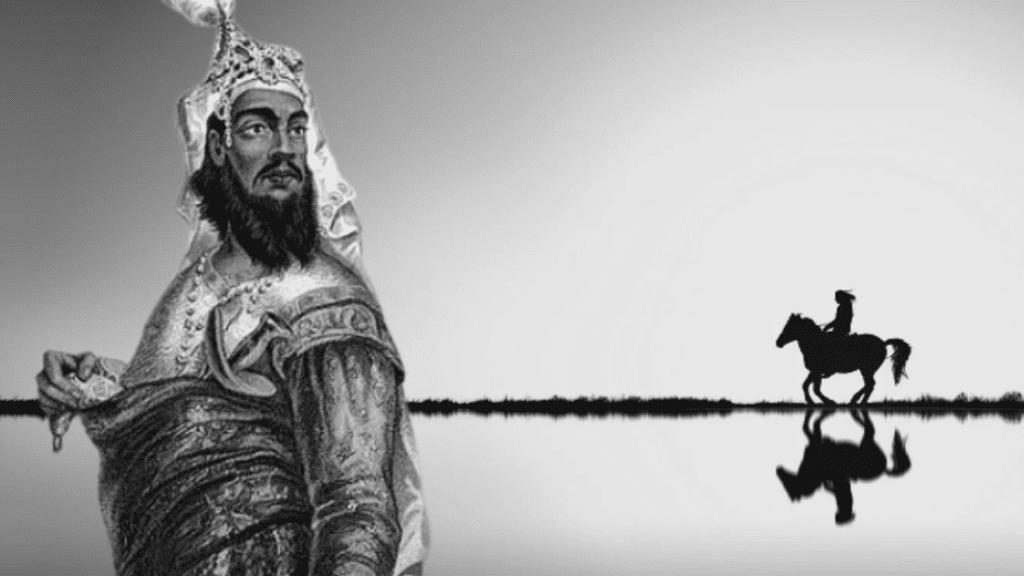Babu Kunwar Singh also known as Veer Kunwar Singh or Babu Veer Kunwar Singh was a freedom fighter from Bihar who fought against the Britishers during the national struggle for Independence. He played an active role in the revolt of 1857 against the Britishers. He fought against the Britishers not just from Bihar but also travelling across the country and joining alliances with different rulers of other parts of the country as well. To pay a tribute to his valour, every year on 13 November Veer Kunwar Singh Jayanti is celebrated. This post covers major details on Veer Kunwar Singh that are important for you to know.

Who was Babu Kunwar Singh
Babu Kunwar Singh or Veer Kunwar Singh was a great Indian Freedom Fighter from Bihar. He fought against the Britishers in many agitations including the famous revolt of 1857.
He was born on 13 November 1777 in Jagdishpur, Bihar to Raja Sahebzada Singh who was a kind-hearted Zamindar and Rani Panchratan Devi Singh. He belongs to the clan of rulers of Raja Bhoj. He belonged to Ujjaiyniya Rajput Clan. Kunwar Singh was the eldest son. His brothers were Amar Singh, Rajapati Singh, Ritnarayn Singh and Dayalu Singh. His Nephews were Nishan Singh and Jaikishan Singh. His brothers and his Nephews were his ardent followers and they also took active participation in Kunwar Singh’s endeavours.
Kunwar Singh developed many markets, constructed wells, and built arms and ammunitions factory in his region. Kunwar Singh has fought and contributed to the fight against the Britishers for a long time. He had played a key role in the revolt of 1857 against the Britishers. Many Zamindars like Narhan Singh, Joohan Singh, Thakur Dayal Singh and Bisheshwar Singh also supported him.
Role of Kunwar Singh in the Revolt of 1857
Kunwar Singh an 80-year-old Man at this time, reigned in the Jagdishpur area of Bhojpur, Bihar. The people of Bihar looked at Kunwar Singh as a natural leader. On July 25, 1857, Indian Sepoys of Danapur revolted and marched towards Ara. They joined Kunwar Singh. Kunwar Singh along with his troops surrounded the British in Ara. Captain Dunbar was sent from the British side but Kunwar Singh defeated him and won the areas around Rohtas and Bhojpur Districts.
Later, Major Eyre was going to Allahabad and when he reached Ara he came to know about the situation and the defeat of the Britishers in the hands of Kunwar Singh. Kunwar Singh fought with Major Eyre but at this time on August 3, Kunwar Singh was defeated. Kunwar Singh fled from Bihar and kept his struggle alive against the Britishers.
He went to Rewa and Gwalior in Madhya Pradesh, Kanpur and Lucknow in Uttar Pradesh and continued his fight against the British with the support of rebels of other regions. Kunwar Singh moved from Rewa to Banda and then to Kalpi. He was not allowed to enter Rewa as the Raja of Rewa was a supporter of the British. Then he moved to Banda and Kalpi. He joined the troops at Gwalior and took an active part in fighting the battle of Kanpur along with the troops of Nana Saheb. Britishers again won this battle but Kunwar Singh didn’t give up and moved towards Lucknow.
Kunwar Singh’s indomitable will win the praise of the Shah of Awadh. An important event during these happenings was the gifting of a Robe of Honour, a Firman for the district of Azamgarh and twelve thousand Rupees by the Shah of Awadh to Kunwar Singh.
After fighting in different regions Kunwar Singh went to Azamgarh near Atrulia and joined his associates on March 17, 1858, and fought against the Britishers led by Col Milman and Col Dames. Eventually, Kunwar Singh took control of Azamgarh.
After controlling Azamgarh for some time Kunwar Singh by analysing the situation moved toward Jagdishpur leaving his small troops in Azamgarh. His vision was to return and recapture Jagdishpur. He crossed the river Ganges and on April 21, 1858, fought bravely with the British troops under Brigadier Douglas.
In this battle Kunwar Singh lost his left arm. But, without any loss of enthusiasm, Kunwar Singh crossed the Ganges even in such pain. He reached Jagdishpur on April 23, 1858. He again fought against the British force led by Captain Le Grand at this time. Worn out by continuous fighting and the loss of one of his arms he died on March 26, 1858, three days after he won over Le Grand’s troops.
After his death, his followers continued the struggle against the Britishers in different regions of Bihar under the able leadership of his brother Amar Singh. Amar Singh also fought against the Britishers with Guerilla tactics from the hills.
Kunwar Singh in Modern Time
On April 23, 1966, the Republic of India released a commemorative stamp in recognition of Kunwar Singh’s involvement in the Nation’s independence movement. The Bihar Government also established Veer Kunwar Singh University Ara in 1992 in honour of Babu Kunwar Singh. Ara Chapra Bridge which was made in 2017 to connect North and South Bihar is also named after Veer Kunwar Singh. It is named Veer Kunwar Singh Setu. On his 160th death anniversary in the year 2018, the Government of Bihar renamed the Hardinge Park in Patna as Veer Kunwar Singh park and placed a statue of him in the Park.
Babu Kunwar Singh FAQ
Kunwar Singh was the King of which place?
Kunwar Singh was the King of Jagdishpur, Bhojpur, Bihar.
In which revolt Babu Kunwar Singh took an active part from Bihar?
In the Revolt of 1857, Veer Kunwar Singh took an active part from Bihar.
In which Battle outside Bihar Kunwar Singh took an active part?
In the Battle of Kanpur outside Bihar Kunwar Singh took an active part.
Who presented the robe of honour to Babu Kunwar Singh?
Shah of Awadh presented the robe of honour to Kunwar Singh.
At which place Kunwar Singh was prevented to Enter?
Kunwar Singh was prevented to Enter Rewa.
When Kunwar Singh Died?
Veer Kunwar Singh died after winning the fight against a unit of Britishers after the revolt of 1857 on April 26, 1858.
What was the name of Kunwar Singh’s Brother who knows Guerilla tactics?
Amar Singh was the brother of Kunwar Singh who was skilled in Guerilla Warfare.
What was the age of Babu Kunwar Singh at the time of the revolt of 1857?
The age of Babu Kunwar Singh at the time of the revolt of 1857 was 80 years.
Get Regular Updates on BPSC Exam
Babu Kunwar Singh is a Very Important Personality for BPSC Exam. BPSC has asked many questions about Babu Kunwar Singh in Prelims objective Type as well as Mains Subjective Type. You must read about Babu Kunwar Singh in order to answer these questions well.
Get regular Updates on BPSC Exam. Send an E-mail to bpscpreparationonline@gmail.com to get regular updates and important information about the exam. Copy Paste ” I want regular Updates on BPSC Exams” and send the E-Mail to bpscpreparationonline@gmail.com. We will Keep you updated.
Read More:

